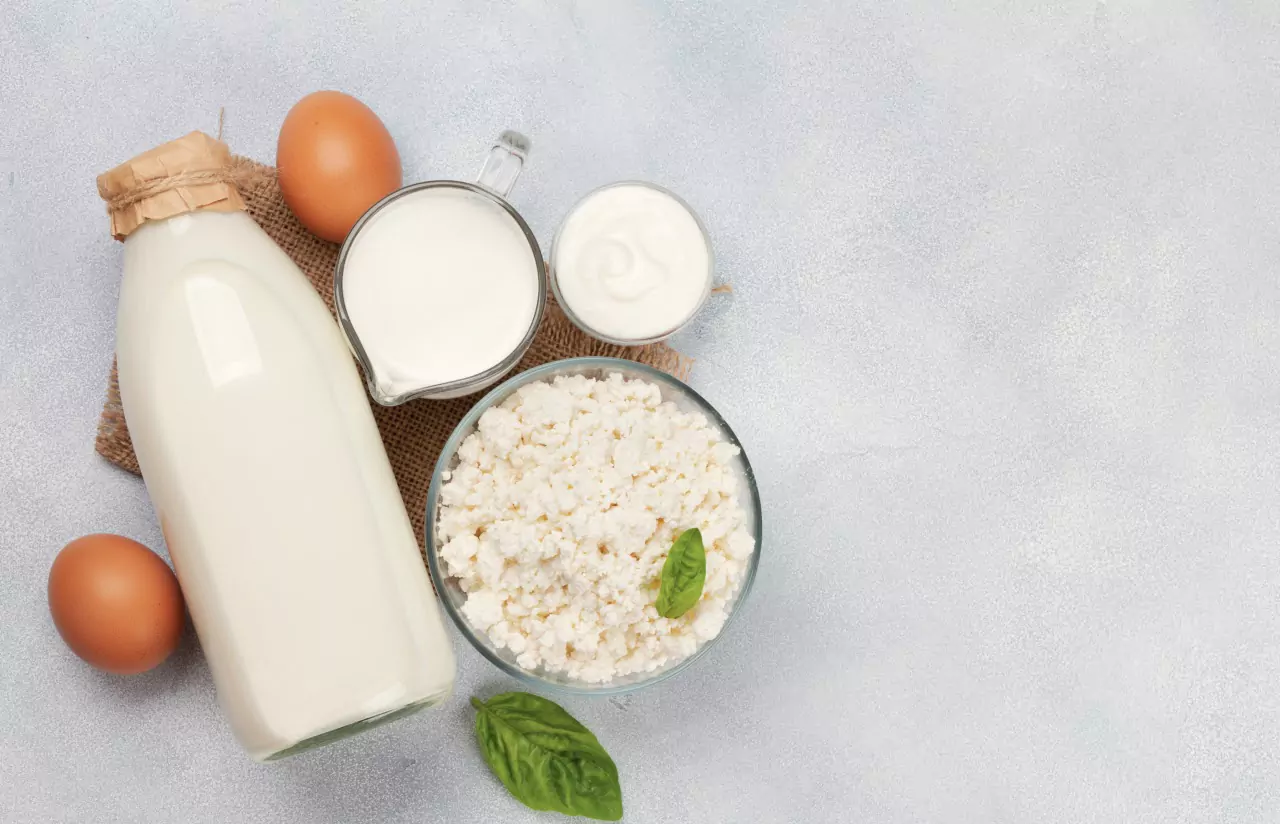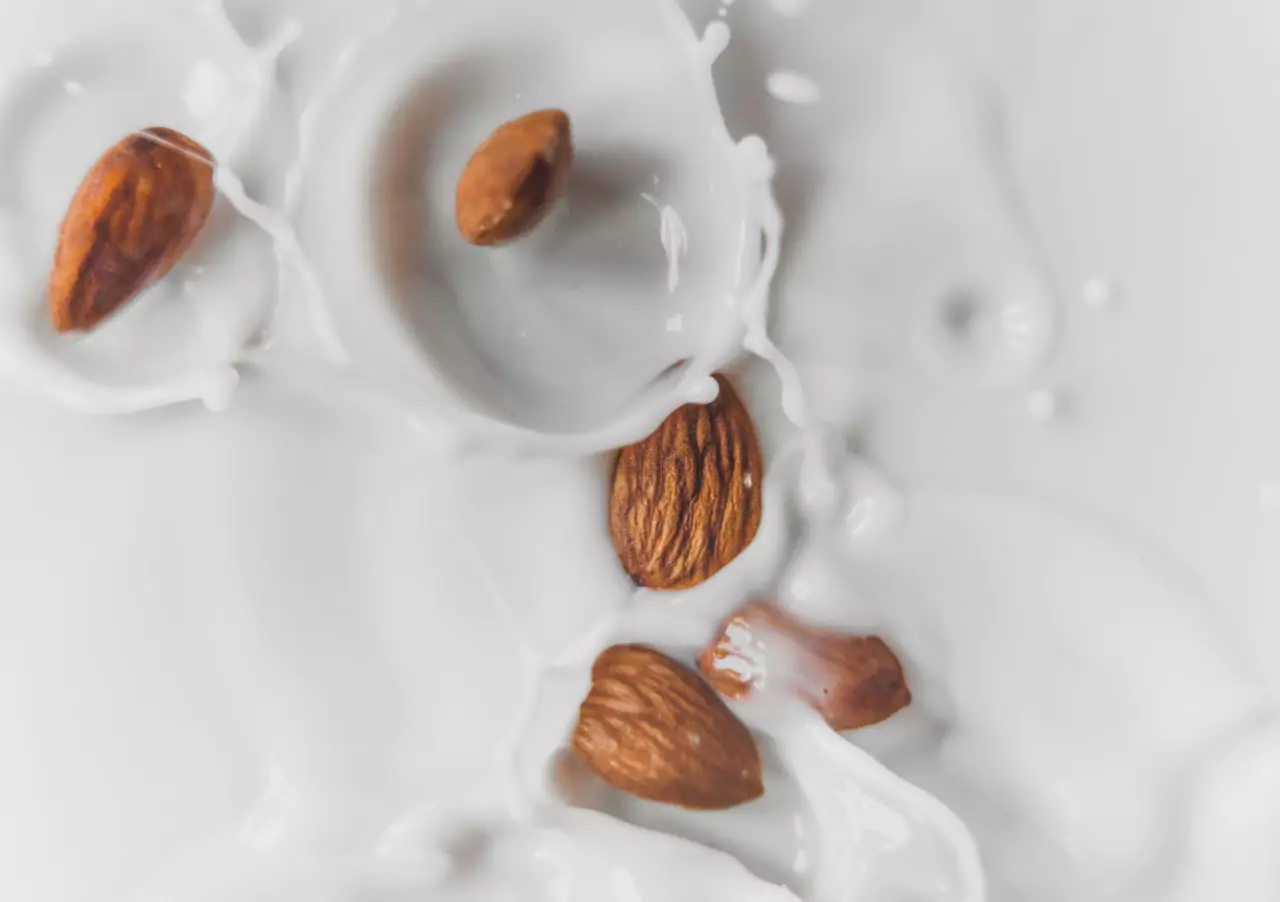Does Milk Raise Blood Sugar? A Glucose Expert Explains

Key Takeaways
Dairy products like milk, yogurt, and cheese have long been considered an everyday essential for strong bones and overall health. These days, from good old cow’s milk to different types of milk (including dairy-free and plant-based milk alternatives), and from lactose-free to low-fat versions... discussions around dairy consumption are more complex.
So, what’s the real deal? Are dairy products healthy, or harmful? And more importantly, how do they affect your blood sugar or glucose levels, especially if you’re managing conditions like prediabetes or insulin resistance?
At Nutrisense, we believe nutrition isn’t one-size-fits-all, and the best way to see how it affects your health and glucose is to work with a nutrition expert to find out! But to get you started, we’re giving you the lowdown on the relationship between milk and blood sugar, and how to tell if it’s a good fit for your health goals—so you can make informed decisions based on science, not trends.
Dairy's Impact on Blood Glucose Levels

Your glucose levels play a key role in your overall health. If your blood sugar levels get too high (hyperglycemia) or too low (hypoglycemia), it can affect how you feel and how well your body functions.
While blood sugar monitoring is often associated with diabetes, blood glucose monitors and finger pricks, tracking glucose can be useful for anyone—especially if you’re trying to better understand how your body responds to food. This is where non-diabetic glucose monitoring can come in handy. And there’s an easy way to do it with tools like glucose biosensors and CGMs.
Which Milk Does Not Spike Blood Sugar?
All dairy products contain carbohydrates, although the amount varies in different dairy products with varying fat and protein levels.
- Lactose, present in milk, is a type of carbohydrate. So you could see your blood sugar levels rise slightly when you consume dairy products.
- However, dairy products also contain fats and proteins, which can help prevent blood sugar spikes.
Confused? Let’s clarify with an example: You may see a smaller spike in your glucose levels when you consume whole milk than 1% milk, thanks to those fats and proteins in whole milk.
Those without diabetes typically have fasting glucose levels between 70–90 mg/dL and post-meal levels under 140 mg/dL. However, normal glucose levels differ for everyone! Work with a glucose-certified expert to see what “normal” looks like for you.
Types of Milk to Avoid
The fat in dairy products can help with glucose control. However, those with high sugar and fat content can cause prolonged spikes. The fat slows carbohydrate absorption, which could lead to extended periods of elevated blood sugar. To prevent this, try to limit dairy products with added sugars, such as flavored milk, sweetened yogurt, and ice cream.
A common trap people fall for is hidden sugar in dairy products. Remember to read the nutrition labels!
Does Dairy Spike Insulin?

Dairy has been found to result in increased insulin resistance in some. A study published by the United States National Library of Medicine found it had a notable effect on insulin resistance among middle-aged non-diabetic women.
Another study released by the American Journal of Clinical Nutrition showed that people who consumed high-fat dairy products were less likely to develop type 2 diabetes.
There is conflicting evidence regarding dairy and blood glucose, and research is still ongoing. For the moment, it seems that people need to consider dairy in their diets on a case-by-case basis, experimenting to discover if their bodies handle it well.
How Fast Does Blood Sugar Rise After Drinking Milk?
This will depend on your individual response to it. Consider experimenting for yourself! You can track your responses with a health program like Nutrisense, using a glucose biosensor to track your glucose levels when you consume dairy. This way, you can see exactly how your body responds to different types of dairy, helping you make informed decisions about your diet.
It's also a good idea to work with a health professional like a registered dietitian or certified nutrition specialist, who can help you understand all the data and how dairy affects your system. With their knowledge and experience, they can guide you on making the best choices for your overall health and wellness.
Some Health Benefits of Milk & Dairy

If your body responds well to dairy, it can add several valuable nutrients and vitamins to your diet such as potassium, phosphorus, magnesium, B vitamins, and zinc. It also can have many health benefits too!
It’s a Good Source of Calcium
Dairy can provide a great source of calcium to help strengthen your bones. It may offer more calcium than other common calcium-rich foods. Calcium provided by the food you ingest can be more effective for bone health than supplements.
It Packs a Punch with Protein
Dairy is packed with protein. There are two types of milk proteins found in dairy products: whey protein, and casein. The main difference between the two is digestive time: whey digests more rapidly than casein.
It Can Aid Digestive Health
Fermented foods, including yogurt and kefir, are good sources of probiotics that are important for gut health. Probiotics help the good bacteria in your gut stay balanced and healthy.
Your Dental Health will Thank You
Your teeth, like your bones, can benefit greatly from the calcium content in dairy products.
Exploring Types of Milk, Dairy Products, and Milk Alternatives

Now that you know a bit about dairy, what it contains, and how your body may respond, here's more information about some common types of milk and some milk substitutes. Remember that not everyone responds well to all substitutes, so don't make any drastic changes to your diet without consulting a healthcare professional and monitoring how your body responds.
Whole Milk
If you're going to enjoy a glass of milk, whole milk may be the most glucose-friendly option for some. The higher fat content in whole milk will slow the sugar uptake from the carbs in lactose.
Nutritional Information
[per one cup]
- 149 calories
- 8 grams of fat
- 12 grams of carbohydrates
- 8 grams protein
- 0 grams fiber
- 12 grams sugar
Skim and Low-Fat Milk

If you want to lower your calorie count by consuming skim milk, you should know that the lower fat content may leave some more vulnerable to a blood sugar spike. If you aren't pairing the milk with other proteins or fats, consider opting for full-fat milk instead.
Nutritional Information
[per one cup]
- 83 calories
- 0.2 grams of fat
- 12 grams of carbohydrates
- 8.3 grams of protein
- 0 grams of fiber
- 12 grams of sugar
Oat Milk
Oat milk is a popular alternative to dairy, and it contains healthy fats. But some types may contain added sugars and flavorings, so read the food labels. Oat milk is typically higher in carbohydrate count and lower in protein than regular milk.
Nutritional Information
[per one cup/ unsweetened]
- 130 calories
- 1 gram of fat
- 29 grams of carbohydrates
- 2 grams of protein
- 1.5 grams of fiber
- 19 grams of sugar
Almond Milk

Like oat milk, almond milk is not technically dairy but a popular alternative to it. Almond milk has a lower carbohydrate count than whole and skim milk, but it contains less protein.
Many types of almond milk are flavored and sweetened, so make sure that you read the labels when selecting this type at the store.
Nutritional Information
[per one cup/ unsweetened]
- 56 calories
- 2.5 grams of fat
- 8.1 grams of carbohydrates
- 1.1 gram of protein
- 0.6 grams of fiber
- 7.2 grams of sugar
Soy Milk
Soy milk is not for everyone (if you have a soy allergy, for example). But if your body tolerates it, it can be a good alternative. Soy milk contains more protein than dairy milk and has essential amino acids.
Scientists have found that consuming soy products is linked to improved glucose tolerance. It's also rich in calcium, much like dairy. If you're looking for a close alternative to dairy, this may be the one. Soy milk is often sweetened and flavored, so read the labels before buying a carton.
Nutritional Information
[per one cup/ unsweetened soy milk]
- 100 calories
- 4 grams of fat
- 5 grams of carbohydrates
- 10 grams of protein
- 1 gram of fiber
- 0 grams of sugar
Rice Milk
Another popular alternative to dairy, this plant milk is usually naturally sweeter than other dairy alternatives. Still, rice milk is high in carbohydrates and lower in protein levels, so it may not be the perfect alternative to dairy if you are concerned about regulating glucose.
Nutritional Information
[per one cup/ unsweetened]
- 113 calories
- 2.3 grams of fat
- 22 grams of carbohydrates
- 0.7 grams of protein
- 0.7 grams of fiber
- 13 grams of sugar
Glucose expert Amanda Donahue, MS, RD, CD, adds, “Some of my members respond well to protein-rich milks too, like pea milk. Or, you can try seeing how your body responds to high protein milk!”
Yogurt
Plain yogurt is a good source of probiotics, and may not lead to frequent spikes. Greek yogurt contains the greatest amount of protein. Full-fat yogurt has more fats and protein, so if you don't mind the calories it is the better option for your glucose levels.
There are also non-dairy alternatives made from almond, coconut, or other plant-based milks, ideal for those with lactose intolerance or a dairy-free diet.
Nutritional Information
[per one cup/ unsweetened]
- 45 calories
- 2.3 grams of fat
- 0 grams of carbohydrates
- 4 grams of protein
- 1 gram of fiber
- 0 grams of sugar
Cheeses

Cheese is high in protein and low in carbohydrates. There are so many different types of cheese that it's impossible to give you any blanket advice on the nutritional content here. As an example, here are some facts about cheddar cheese.
Nutritional Information
[1oz of cheddar cheese]
- 115 calories
- 9.4 grams of fat
- 0.9 grams of carbohydrates
- 6.5 grams of protein
- 0 grams of fiber
- 0.1 grams of sugar
Ice Cream
Arguably one of the most exciting forms of dairy, it's usually best to consume this one in moderation! Ice cream can have several added sugars, flavors, cookies, and candies mixed in, which will raise the likelihood of a blood sugar spike. Vanilla ice cream may be the "safest" option, and some vanilla is naturally derived, containing less sugar.
Nutritional Information
[1 cup vanilla ice cream]
- 273 calories
- 15 grams of fat
- 31 grams of carbohydrates
- 4.6 grams of protein
- 0.9 grams of fiber
- 28 grams of sugar
Sour Cream
Sour cream, although a tasty addition to many dishes, can be high in calories and fat. When used in moderation, it can enhance flavor and richness without significantly affecting glucose levels. However, portion control is crucial. Choosing light or reduced-fat versions is a good option!
Nutritional Information
[per 100g]
- 475 calories
- 46.4 grams of fat
- 11.1 grams of carbohydrates
- 5.86 grams of protein
- 0 grams of fiber
- 8.18 grams of sugar
Cottage Cheese
Cottage cheese is another dairy product widely embraced for its nutritional benefits. It's rich in protein, making it a popular choice among athletes and those looking for weight-loss friendly dairy. Lower in fat and carbohydrate contents, it’s a versatile ingredient that can be a substitute for cream cheese or ricotta cheese, with a better protein boost.
Nutritional Information
[per one cup / 2% fat]
- 98 calories
- 4.3 grams of fat
- 3.38 grams of carbohydrates
- 11.1 grams of protein
- 0 grams of fiber
- 2.67 grams of sugar
Other Fermented Dairy [Kefir]

Some studies show links between kefir and lower fasting glucose, likely because of its probiotic properties. It can be a good dairy option for people trying to regulate their blood sugar levels.
Nutritional Information
- 112 calories
- 2.2 grams of fat
- 12 grams of carbohydrates
- 11 grams of protein
- 0.1 grams of fiber
- 12 grams of sugar
Whey Protein Powder
Whey protein is derived from milk and often sold as a nutritional supplement. There is whey protein concentrate and whey protein isolate. Generally, whey isolate has a higher protein content and lower carbohydrate and fat content.
Research has found a link between whey consumption and increased insulin production and insulin sensitivity. It may also reduce spikes when consumed alongside foods rich in carbohydrates. It's a good idea to consult with a healthcare professional before introducing new foods or supplements into your diet.
Nutritional Information [Optimum Nutrition Gold Standard Whey Protein, 1 Scoop]
- 120 calories
- 1.5 grams of fat
- 3 grams of carbohydrates
- 24 grams of protein
- 1 gram of fiber
- 1 gram of sugar
Find the right Nutrisense programto turn insight into progress.
See How Milk Affects Your Body with Nutrisense
Dairy products are wonderful sources of protein, calcium, and other essential nutrients that can play a role in maintaining healthy glucose levels. However, like any food, it's crucial to be mindful of portion sizes and select healthy options that align with your dietary needs and goals.
If you're curious about how different dairy products affect your glucose, consider working 1:1 with a glucose expert. At Nutrisense, you can sign up for insurance-covered video calls to work with a personal dietitian certified in glucose, to experiment and tailor your diet to your goals.
You can also track your glucose using health tech like glucose biosensors and continuous glucose monitor (CGM)s, and analyzing trends over time in a companion app like the Nutrisense App. This will help you make the most informed choices about the foods you consume and their impact on your health.
Ready to take the first step? Start with our quiz to find the right Nutrisense program to help you take control.
FAQs
Got a question? Our team of health experts is here with the answers you need! In the meantime, here are some common questions, answered by the registered dietitians and nutritionists at Nutrisense:
Can those with diabetes drink milk?
Yes, you can drink milk if you have diabetes, but it is crucial to select the right type and monitor portions to manage carbohydrate intake effectively. What you also need to consider is the fat content in different types of milk if you have other health conditions, such as high cholesterol. Consulting a healthcare professional and monitoring your glucose is a good way to make the right decision for your body.
Can lactose-free milk affect my glucose levels?
Lactose-free milk, typically derived from cow's milk, has the enzyme lactase added to break down lactose. Like regular cow's milk, it contains carbohydrates that can impact blood sugar levels. However, if you're lactose intolerant or have difficulty digesting dairy, lactose-free milk could offer digestive health benefits. Always read labels and consult a registered dietitian or nutritionist before adding new foods to your diet.
Will drinking milk help control blood sugar with diabetes?
Like most foods, milk itself can’t ‘control’ your glucose or blood sugar levels, but the protein and fat it contains can help slow the absorption of carbohydrates, potentially preventing spikes for some. Some studies suggest dairy intake can lower the risk of type 2 diabetes. However, it's essential to align milk consumption with your overall dietary goals and work with an expert to tailor your diet to your specific needs.
Is cheese a good choice for people with diabetes?
Cheese can be included in a balanced diet for people with diabetes. Depending on what suits your body, some can pair a small portion of cheese and carbohydrates as a snack to help maintain steady blood sugar levels throughout the night. However, remember cheese can be high in fat (some processed types can have saturated fats too).
Go Beyond Glucose Data with Nutrisense
Your glucose can significantly impact how your body feels and functions. That’s why stable levels are an important factor in supporting overall wellbeing. But viewing glucose isn't enough. Nutrisense, you’ll be able to learn how to use your body's data to make informed lifestyle choices that support healthy living.
One-to-one coaching
Sign up to access insurance-covered video calls to work with a glucose expert: a personal registered dietitian or certified nutritionist who will help tailor your lifestyle and diet to your goals.
Monitor and measure what matters
With the Nutrisense CGM Program, you can monitor your glucose with health tech like glucose biosensors and continuous glucose monitor (CGM)s, and analyze the trends over time with the Nutrisense App. This will help you make the most informed choices about the foods you consume and their impact on your health.
Find your best fit
Ready to take the first step? Start with our quiz to find the right Nutrisense program to help you take control.

Amanda is a Nutrition Manager and Registered Dietitian, with a Masters in Dietetics from Stephen F. Austin State University. Originally from south GA, she got her undergrad degree from Texas Tech University. She worked at a hospital in Fort Worth, TX, for 4 years as a dietitian, counseling those living with HIV.




